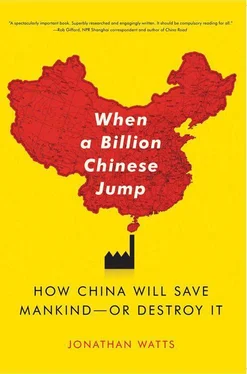I doubt they have the authority to achieve this. Despite the politburo’s nominally dictatorial powers, it is either reluctant or unwilling to impose any measure that might constrain growth. Indeed, it often punishes those who try to do so. Environmental activists who expose pollution scandals are sometimes beaten up, locked away, or censored. Religions, unions, journalists, lawyers, universities, NGOs, aristocracies, and other independent sectors of society that resisted untrammeled economic expansion in other nations have either been abolished or kept under tight control.
Power resides not at the top or bottom of society, but in the bulging middle band of local party chiefs, factory owners, foreign investors, and outsourcers who have profited most from the lack of environmental regulations. As I saw in Guangdong and Heilongjiang, these Mini-Maos in regional governments do not take kindly to any measure that curtails their expansion. They are the reason the government, despite its authoritarian reputation, is less able to rein in polluters than dissidents.
To counter this, it is often argued that China needs more democracy and a bigger middle class. But people power alone will not solve all of the country’s environmental problems. A swelling middle class could make things much worse unless beliefs and lifestyles also change. In this case, the West has set a dire example in dealing with the biggest threat of our age: consumption.
Pollution was yesterday’s priority. Climate change is tomorrow’s. Both are symptoms of a bigger, more immediate malaise: the unsustainable consumption pioneered by advanced, wealthy democracies, and now increasingly replicated by rich citizens of developing nations like China.
Having visited almost every province in the country, I am far more concerned about Shanghai’s friendly shoppers than Henan’s snarling polluters. The latter are a recognized problem that can be cleared up with sufficient time, money, and government effort. The former, however, are hailed as potential saviors of the global economy. Nobody wants to stop them. Indeed, businesses spend a fortune encouraging consumers to spend more. Their advertising campaigns have proved devastatingly successful. The energy use of the average person in Shanghai has surpassed that of Tokyo, New York, and London and is now 50 percent higher than the global norm.
The rest of the country has some way to catch up, but that is what the government wants. To provide everyone in China with a Shanghai lifestyle, factories will need to churn out an extra 159 million refrigerators, 213 million televisions, 233 million computers, 166 million microwave ovens, 260 million air conditioners, and 187 million cars. Power plants would have to more than double their output. The demand for raw materials and fuel will add enormously to global environmental stress and security strains.
The story of China is changing. On one hand, it is still partly the heart-warming tale of a poor nation catching up with the West. But it is also increasingly the threat of wealthy individuals and megacities that are gobbling up resources and producing waste at a rate that is as destructive and unsustainable as almost anyone and anywhere overseas. The cultural and economic line between “them” and “us” has blurred. But our shared environmental reflection could hardly be more clear or less flattering.
Faced by the resource depletion and climate change, the world community needs to shift away from nationalist competition to consume, and toward an internationalist cooperation to conserve. If the planet’s resources were priced properly for their long-term value to future generations, rather than their immediate accessibility, mankind might just be able to avoid a disastrous fight for what’s left. I am not holding my breath. It’s a big “might.” As the Copenhagen climate conference showed us, no government—of whatever political stripe—wants to raise prices or tell citizens to consume fewer resources.
For China, that is particularly difficult. The leadership has no electoral mandate. It relies on economic growth and nationalism for legitimacy. How can Hu or Wen possibly say to their people, “You cannot eat as much or buy as much as citizens in rich nations”? How can consumers in wealthy countries have the temerity to complain if they do?
Strictly in terms of equality, China should have the same scope to damage the planet in the future as rich nations have done in the past. It should also have the same right to consume. This would be completely fair and utterly calamitous. It would allow China to increase its emissions beyond 2050. By that time, the atmosphere will increasingly resemble an Inner Mongolian stew, presuming nations have not gone to war before that over scarce energy supplies or the right to shop for luxuries.
A better environment needs better values. It is unreasonable to ask China to save the world, but the country forces mankind to recognize we are all going in the wrong direction. Technological progress is essential, but it is not enough. Before we retool our economies, we need to rethink our fundamental beliefs. In this regard, China has much to contribute.
The country’s environmental and philosophical history should be more deeply mined. The world’s longest-enduring civilization offers lessons in how to sustain, such as the Taoist appreciation of “useless trees” or the growing academic skepticism toward “foolish old men who move mountains.”
Ethnic, social, and cultural diversity is likely to be another source of new ideas. Antidotes to materialism can be found in the nature worship of Tibetan and Mongolian Buddhism. There are traces of sustainability in the day of rest practiced by the country’s Muslims and Christians. Temples nationwide have some of the best-protected wildlife.
China’s ideological mixing pot may also throw up more sustainable practices. As resources dwindle, a new generation of market devotees will look for greater efficiency through pricing mechanisms, while old-school state interventionists will press for tax and feed-in-tariff incentives to manage demand. Communes and work units should join a wider discussion with companies, NGOs, and netizens about how to share wealth, food, and materials.
Individuals—those ones in a billion—can also provide inspiration, whether it be the dogged survival instinct of the Meng Brothers, the innovation of Dalian’s scientists, the courage of environmental activists, 3the preference of Beijing taxi drivers for flasks of tea over cans of Coke, the experience of intellectuals sent down to the countryside, or the self-sacrifice of migrant workers everywhere.
A new outlook is essential. This is not a matter for one country or one generation. Mankind has climbed to a peak in China, but our position is precarious and the view from the summit is appalling. Here, more than anywhere, the world has been unbalanced by superlatives, by billionfold multiplication, by earth-changing jumps. Here, more than anywhere, the current path of human progress looks certain to lead to destruction. Here, more than anywhere, we all need to look forward and step back.
Two types of journey are reflected in this book: the physical hauls across China and the mental slog of writing. Neither would have been possible without those who provided guidance, shelter, love, and encouragement along the way.
Setting off on these travels would not have been possible without the Guardian, which assigned me to China and later granted six months’ book leave for research and writing. The newspaper’s independence and commitment to environmental issues have shaped much of the reporting in these pages.
My agent, David Fugate, put me on the path of book writing and made sure I stayed the course with patience and professionalism. I would have dawdled far longer on the early stages of that road were it not for supportive prods by Yang Ailun, Xie Yan, and Lisa Foreman.
Читать дальше










